8 most common mistakes you make when washing dishes
When washing dishes, it is good to wash the bowl with hot water by wearing gloves so that the remaining food can be thoroughly washed in order to soften the remaining food.
- What is whey protein
- What kind of rice is good for body care
- Which is good for your health, cheap or expensive?
After cleaning, you may think there are no bacteria in the kitchen, but in many cases this is not the case. We often make mistakes when washing dishes.
The sponge in the sink is not only full of germs. When you do the dishes, you make a lot of mistakes, leaving behind excess residue and spreading germs.
Dr. Charles Gerba, a microbiologist at the University of Arizona, has concluded that, after numerous studies, 50 to 80% of all diseases caused by contaminated food occur in the home.
These pathogens cause 6.5 million gastroenteritis each year.
The most common mistakes you make when washing dishes
1. Excessive use of dishwashing detergent
It is a very common mistake to not use the right dish washing detergent or overuse the product. Excessive use of detergent can leave residue on the dishes and get into the food.
You can wash dishes with only hot water and dish washing detergent.
Read the detergent label and follow the instructions that indicate the percentage that should be dissolved in water.
2. Waste a lot of water
It's best to soak all the dishes in hot water to make it easier to wipe off the oil and allow the dishes to dry faster.
- If you have two sinks, take hot water in one place and soak your dishes and kitchen utensils.
- There is also a way to soak dishes in the dishwasher basin, then wash the dishes and rinse them.
- It is important to turn off the faucet every time the dish is cleaned. You can also take a small bowl of water and use it to clean dishes one by one. This will not waste a lot of clean water.
Read more: 5 ways to sterilize a kitchen scrubber
3. Use a plastic sponge
- The most contaminated places in the kitchen can be found in sponges and dishwashers. These are perfect places for thousands of bacteria, such as E. coli and Salmonella.
- Therefore, it is better to use natural fiber sponge. After washing dishes, you must walk to dry. It is also a good idea to change the sponge every week.
4. Do not clean glasses and knives properly
- If you wash the knife roughly quickly, a large amount of residue will remain. However, you need to rinse thoroughly for a long time until all traces of food disappear.
- Glasses should also be washed thoroughly. Even after washing dishes, milk bacteria may remain on the sides.
- Therefore, it is necessary to carefully check and rinse well to prevent bacteria from growing easily.
5. Do not wash your hands before washing dishes
- Hands can be a source of bacteria and viruses.
- It is important to wash your hands with warm water and soap before washing dishes or placing dishes in your dishwasher by hand.
6. Don't care about cutting board
- It is recommended to rinse meat or vegetable cutting boards first. Then wait for the water to drain and then disinfect with chlorine solution or product for 2 minutes.
- It is a mistake to wash the cutting board with a sponge and dish washing detergent as usual. This will not clean properly.
7. Wash the dishes in a dirty sink
Kitchen sinks may contain more bacteria than toilets.
It is a good idea to clean your sink daily with vinegar and baking soda or vinegar and salt.
This will allow you to wash dishes without bacteria accumulating and everything being sterilized.
8. Do not rinse dishes in advance or remove food
- First, all remaining food must be thrown into the trash. Any remaining residue can be removed with a spatula.
- All dishes and kitchen utensils must then be soaked in hot water to remove and clean the residue.
- If you make the mistake of not removing the food left on the tableware, the food will get all over the sink.
Tips for optimal washing dishes
- Use hot water and rubber gloves when washing dishes.
- Kitchen utensils that come in contact with raw meat should be washed last. This will prevent cross-contamination.
- Wipe the dishes dry with a clean, dry cloth and look at the dishes once more.
- Wooden cutting boards can be disinfected with lemon and salt.
It is important to consider all of these points to prevent diseases caused by bacterial transmission. Not only can you take care of your health, but your dishes will look new.







Right
ReplyDelete